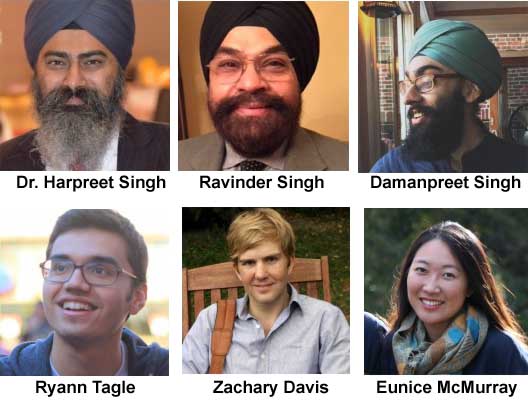Explore Sikhi with Harvard’s Sikhism Through Its Scriptures Online Course
Sikhs seeking their civil and political rights across the world, including in the USA have generated keen interest among the community’s younger generation as well as others about Sikhs and their religion. Harvard University launched an online course Sikhism Through Its Scriptures course in 2018, which has so far seen 50,000 registrants, of which a good 30 per cent are non-Sikhs. With barely a few months left and while we are still under a lockdown mode, World Sikh News invites readers to know more about Sikhs and Sikhi by enrolling to this at-home study.
![Sikhs seeking their civil and political rights across the world, including in the USA have generated keen interest among the community’s younger generation as well as others about Sikhs and their religion. Harvard University launched an online course Sikhism Through Its Scriptures course in 2018, which has so far seen 50,000 registrants, of which a good 30 per cent are non-Sikhs. With barely a few months left and while we are still under a lockdown mode, World Sikh News invites […]](https://www.theworldsikhnews.com/wp-content/uploads/2020/06/harward-Uni-360x266.jpg)
As part of the Harvard University’s Religious Literacy Program initiative to make the world’s faith traditions known the general public on its edX platform, the Harvard University launched an introductory, online course titled, Sikhism Through Its Scriptures in August 2018.
Developed by a team led by Dr Harpreet Singh, a scholar of Sikhism and South Asian traditions and languages at Harvard University, with content development by Ravinder Singh -a blogger on matters Sikhi and moderator of online forums on Gurbani. The research, selection of free access media content in text, audio and video sections into holistic sessions was the domain of Damanpreet Singh -a graduate student of Religious studies at Harvard.
The course consists of eight modules, is self-paced, and requires a commitment of 4-10 hours a week to complete in 4 weeks.
Visual and Media Arts wizard Ryann Tagle is the video editor for World Religions Through Their Scriptures with International Relations and Philosophy major Zachary Davis working at HarvardX where he focuses on building open online courses in the humanities. Harvard graduate Eunice McMurray has worked for several years as a faith-based community organizer in Boston and is particularly interested in the intersection of race and religion.

The online course is free and open to anyone. Since the course was launched, an estimated 50,000 registrants from 128 countries have enrolled and the breakdown between Sikh and non-Sikh registrants being roughly 70/30.
I have learnt so much about the Sikh religion, about their bravery, about their forgiving nature, about their sacrifices just to help and save others, and Sikhs facing discriminations and bad experiences in Diasporas after which they still walked on the path of their Sikh beliefs and served others with food by following the Langar system in their homeland as well as in foreign countries- I have gained so much knowledge of Sikhism through this course of which I was always unaware about, even after being born in the Sikh family.
According to the feedback received, Sikhs have enrolled for the course to either re-discover their roots or deepen their understanding of Sikhi. For non-Sikhs, it is an exploration into a religion and faith tradition they don’t know much about.
Thank you to all who worked together to produce this course! This was my first real look into Sikhism and I really appreciate scholars of your depth taking the time to create a free course for everyone. The course left me with a lot of questions (as it should!) and I’ll continue to delve into the concepts of Sikhism. Many thanks!
Although Sikhi is the world’s fifth-largest religion in terms of followers, it is relatively unknown and often misunderstood. Sikhi also remains largely unrepresented in universities in the West, despite the fact that Sikhs are a highly visible global minority.
Allow me to express my gratitude to you personally and to Harvard University for allowing me to have the honor to participate in this course, and to thank you for the deep dive in Sikhism with a trusted source and pure academic concept. As I mentioned in my self-introductory that I was inspired by many Sikh friends (male and female) surrounded my professional and personal lives with amazing features that created my ultimate comfort zone among them and their families.
While major universities across North America have faculty dedicated to Christianity, Judaism, Islam, Hinduism and Buddhism, Sikhi is taught, with a few exceptions, on a part-time basis.
I, from the bottom of my heart, really appreciate and thank the teachers who are part of this teaching team, especially to our professor Mr. Harpreet Singh. After completing this course I feel really proud that I belong to this brave Sikh community.
The course consists of eight modules, is self-paced, and requires a commitment of 4-10 hours a week to complete in 4 weeks. No prior knowledge of Sikhi is required. Each module combines text, audio and video to examine Sikhi from a doctrinal, historical, political and cultural perspective.
Thank you for this course, I didn’t know anything about Sikhism before this and I feel like an improved human being by knowing.

Each student can expect to come away from the course with the following:
- An exploration and engagement with the foundational Sikh text, the Japji: its structure, recitation and study of its core message.
- An understanding of the Sikh scripture, the Guru Granth Sahib: its history, compilation and structure, its place and impact on the political and cultural evolution of the Sikh community
- Interpretative skills to engage in a nuanced reading of central Sikh concepts like Hukam, Haumai, Naam, Guru/Sabad.
- An appreciation of Gurmat Sangeet, the Sikh musical tradition, as represented in the Sikh scripture and its cultural context
- A look at Sikh aesthetics that includes literature, art, and music
I really enjoyed learning the internal meaning of Japji Sahib, which I used to recite most frequently on a daily basis, without knowing its actual and deep meaning of the philosophical concepts included in it.
The importance of this initiative, given the vast underrepresentation of Sikhi in religious studies, cannot be overestimated. As you can see, the testimonials are encouraging, to say the least. Sikhs are encouraged to access the course, which remains open to all.
 Ravinder Singh spent his formative years in Singapore and Delhi and has lived in the U.S. since 1976. He is a graduate of the University of Rochester, New York. His consuming passion is Sikhs and Sikhi – in all its flavors and dimensions. He has served as Executive Director of the Sikh Research Institute. He has also served on the World Sikh Council, the Ohio Interfaith Association and is the past President of the Guru Nanak Religious Society of Central Ohio. He is Editor of KhojGurbani.org.
Ravinder Singh spent his formative years in Singapore and Delhi and has lived in the U.S. since 1976. He is a graduate of the University of Rochester, New York. His consuming passion is Sikhs and Sikhi – in all its flavors and dimensions. He has served as Executive Director of the Sikh Research Institute. He has also served on the World Sikh Council, the Ohio Interfaith Association and is the past President of the Guru Nanak Religious Society of Central Ohio. He is Editor of KhojGurbani.org.

2 thoughts on “Explore Sikhi with Harvard’s Sikhism Through Its Scriptures Online Course”